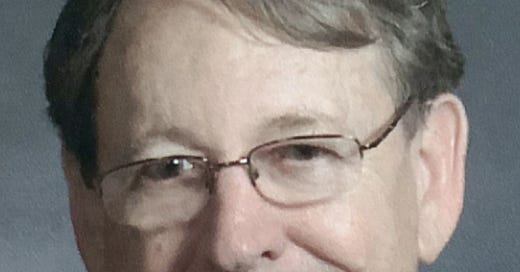Richard H. Coop, 1940-2021
The pioneering sports psychologist helped golfers play to their potential
I’m happy my name is linked, in the smallest of ways, to Richard H. Coop, Ed.D., who I’m sad to learn died at age 81 in late December after suffering from Parkinson’s Disease.
A professor in the School of Education at the University of North Carolina at Chapel Hill for three decades until his retirement in 1999, Dick was a pioneering sports psychologist. In the late 1980s and early 90s I edited his monthly column on the mental side of golf for Golf Illustrated. The other contributor with whom I worked regularly in those days was 1965 PGA champion and longtime ABC golf analyst Dave Marr, and if a magazine staffer has ever been fortunate to collaborate with two people warmer and more decent than those two, I’d like to hear about it.
Richard H. Coop, 1940-2021, was a professor of educational psychology at UNC for 30 years.
Dick’s magazine column was called “Mind Over Golf,” and that was the title of the 1993 book for which I helped him dot the i’s and cross the t’s, a volume that expanded upon the thoughts he’d expressed in the magazine. Its publication came 15 years after he and Gary Wiren teamed to write The New Golf Mind. The first edition of Mind Over Golf: How to Use Your Head to Lower Your Score was victimized by the worst cover in golf-book history other than a memoir by Frank Beard that featured a picture of Tommy Aaron. For our book, the publisher utilized a stock photograph of some anonymous guy lining up a putt. It was a hideous design in stark contrast to the care that Coop took with golf psychology, whether in writing or coaching elite and recreational players alike. (Fortunately, the image anonymous putter guy doesn’t appear on subsequent editions.)
In golf, Dick is most known for his work with three-time major champion Payne Stewart—who wrote the foreword for Mind Over Golf, but he also helped other marquee golfers including Ben Crenshaw, Larry Mize and Scott Simpson. He consulted with athletes of many stripes, including the football and basketball teams at UNC, NASCAR drivers and players in Major League Baseball.
Richard Coop’s 1993 book on the mental side of golf.
My fellow UNC graduate Ward Clayton, a longtime sportswriter, recalled in a tweet how Coop had a hand in the Tar Heels’ 1982 basketball national title. “Dr. C was awesome,” Clayton said. “Remember 40 years ago when Matt Doherty was having FT [free throw] difficulty. Coach [Dean] Smith went to the golf well for Dr. C’s help. Just liked he helped many with putting, he helped Matt with his FT routine and the Heels won it all. Dean strikes again.”
Coop’s influence on Stewart, to whom he was not only an adviser but a good friend, was huge, and his game matured after they began working together. Despite his considerable talent, Stewart had been having trouble closing in the final round. “I was too interested in the end result of winning—and not enough in the process that I had to go through in order to achieve my goals,” Stewart wrote in Mind Over Golf. “Dr. Coop helped me relax and let my swing take over. He encouraged me to develop a consistent pre-shot routine and use it whether it’s my first swing on Thursday morning or the last one on Sunday afternoon, when the pressure of competition is at its greatest.”
Dick was a native of Campbellsville, Ky., also the hometown of Clem Haskins and J.B. Holmes. His parents, Paul and Sara, were teachers. His dad coached football, basketball and baseball, affording him an early view of athletic performance and how the mind played a role in pressure situations. To go with his doctorate degree, Coop could relate to people easily. As his obituary put it, “He was known for having a quick and sharp sense of humor that quickly put athletes at ease, respected for his knowledge, and loved for his ability to take complex ideas and present them in ways that changed peoples’ lives.”
When Golf Digest put together a list of top mental coaches in 2013, Coop summarized his philosophy this way: “I try to help athletes identify and get rid of interferences that limit their success. Performance equals potential minus interference.”
Despite childhood polio that left him with a limp, Dick became an athlete himself. He was a capable golfer, and the first time I played the Old Course at St. Andrews it was with Dick and Golf Illustrated editor-in-chief Al Barkow in 1989. We finished at dusk, tired and hungry, after a long day of travel and a golf experience we’d anticipated a great deal. Dick loved the game, and he helped thousands of others who love it by making a mystery a little less so.




